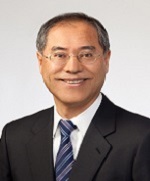Message from Baba, Hideo FOREST Program Officer
FOREST Program Officer:Baba, Hideo(The Chemo-Sero-Therapeutic Research Institute, Director General)

The recent advancements in clinical medicine are truly remarkable. These increasingly sophisticated and diverse developments are supported by translational research. Equally important is reverse translational research, which seeks to resolve clinical questions through basic science. It is through this bidirectional collaboration between basic and clinical research that new diagnostic and therapeutic methods are established. In advancing research, it is essential not to be confined to narrow fields of study. Enhancing the research environment through interdisciplinary collaboration, medical-engineering partnerships, the adoption of efficient methodologies incorporating AI and digital transformation (DX), and domestic and international joint research across organizational boundaries is also of great importance.
Under such circumstances, when conducting clinical research, there is a tendency to focus on research topics that are currently in vogue or that can be accomplished in a short period of time.
However, the Fusion Oriented Research for Disruptive Science and Technology (“the FOREST program”) aims to “create seeds that lead to disruptive innovation,” and is a program that provides long-term support for “diverse research that is free, innovative, original, and fusion-oriented, and is not bound by existing frameworks.”
To that end, we would like to reward long-term, sincere efforts and willingness to take on innovative and ambitious research concepts without fear of risk, rather than focusing solely on producing results within a limited period of time.
This panel will support young researchers in all areas of clinical medicine (other than neurology). We welcome innovative research with clear objectives in all areas of clinical medicine, such as the elucidation of clinically unresolved pathologies and basic research with the potential to lead to new diagnostic and therapeutic methods.
Currently, research methods and technologies are diverse, and it is sometimes difficult to carry out challenging research with only a limited team and limited research facilities. For this program, we would like to provide the greatest possible support in cooperation with the advisors so that researchers in the panel and in other panels in different fields can interact with each other, exchange ideas, and develop into cross-sectional research. Furthermore, we hope that the FOREST program will be used as a foothold to promote international brain circulation and to develop into researchers who can play an active role in a global consortium in the future.
Amid growing concerns over the declining international standing of Japan’s medical research, we would like to invite many young researchers to submit original and innovative research proposals in clinical medicine, and we hope that we can create seeds that will lead to disruptive innovations through friendly competition.

